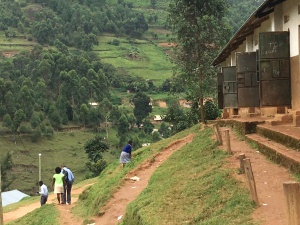Today we visited Rutenga Primary school, the last of the four primaries that CHIFCOD supports. This meant and hour and a half drive on the treacherous road 
that I described in my post about Bunyonyi. This time I managed to take some photos of the men working the timber in the clearings at the edges of the forest. They work, we were told, from first light until 7pm, and need three or four meals a day to keep them going. The staple diet here is matoke (green bananas boiled to a pulp) posho (maize flour mixed with water and cooked to a pulp) boiled or fried cabbage and red kidney beans boiled in water. This is predominantly a carbohydrate diet, and it is hard to imagine that it can sustain men employed in such intensely physical work all day long.
Speaking of physical work, this morning I decided to wash a few small items of clothing. We have found it very difficult to keep clean. You either get covered in a fine red dust if it is dry, or slathered with mud if it is wet. Clothes take along time to dry: there is rarely any breeze, and the air is humid. We have running water here (albeit cold) yet it took me about an hour to wash and rinse everything by hand. Many people do not have mains water, having to rely on streams and rivers for their water. If you are having to collect water in those huge yellow plastic containers we see everywhere, the priorities for using water must be for cooking and washing yourself, with washing clothes low down on the list of priorities. The lack of water from a tap means that everything you do takes an inordinate amount of time to complete.

The only source of water
Rutenga Primary school has 300 pupils and 12 teaching staff. There is no electricity. Their only water is from this source on the left, which used to have a tap attached until some people from the village vandalised the place over the last school holiday, breaking windows and wrenching off the tap. All the pupils are day pupils from the surrounding area. Many of them have to work on the land before they even come to school, and then face the gruelling walk up the mountains to more work before they get fed in the evening at home. Frequently they fall asleep in lessons. There were 67 pupils in Primary 3 class, but only 14 in Primary 7, once again reflecting the statistics that show that pupils drop out of school long before they reach the end of primary education.
 There is no kitchen in the school, yet these two men cook food at lunchtime for 300 pupils on a daily basis. Come rain or shine, they have to prepare , cook and serve the meal here on the hilly rise near the classrooms.
There is no kitchen in the school, yet these two men cook food at lunchtime for 300 pupils on a daily basis. Come rain or shine, they have to prepare , cook and serve the meal here on the hilly rise near the classrooms.
The Deputy Head told us, when asked, of the main problems they face. Some of the main difficulties are a lack of resources (teachers have one textbook, pupils have an exercise book, and that’s it) and the fact that they have no electricity. It would make a

The electricity cable runs across the school grounds
huge difference to them if they could be connected to the electricity which has now arrived in the village (in fact, one of the main cables runs high above the school grounds.) Currently there is no way they can afford it. Their milling equipment (for making maize flour for posho ) is defunct because there are parts missing which they can’t afford to replace, and the cost of fuel to run the mill makes it uneconomical. If they had electricity, that could all change.
The classes we visited were so excited to see us. They don’t see may white faces here.

Primary 3 class
I’m really enjoying your blog, Gill. It’s so hard to imagine how different your life there is from what we are used to here. I showed Walaa your pictures on Monday. She was very interested. Jan Trus
LikeLiked by 1 person
Hi Jan! Lovely to hear from you! I had been thinking of you, Walaa and Khaled, and wondering how it was going. This morning we not only have no power, but no water either!
LikeLike